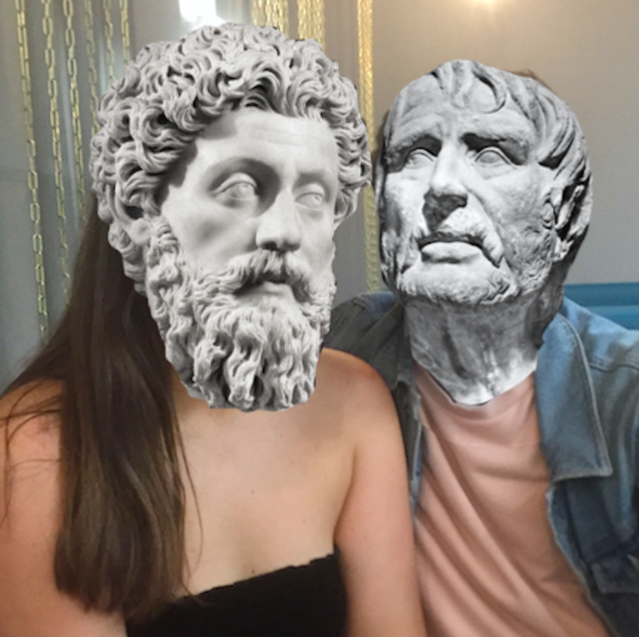Anxiety
The Ancient Roman Cure for Panic Attacks (Part 1)
Techniques of the Stoic philosophers that beat modern anxiety
Posted April 11, 2019

I once suffered badly from panic attacks. At the time I was walking around with dangerously low self-esteem due to seeing myself as a “failure”. My inner-critic was working overtime and causing me to have panic attacks in supermarkets, and this prevented me from purchasing food to feed myself with. I would stand in front of a hundred yogurts in the dairy aisle and my thoughts would start to race - a bit like this:
“Why are there are so many flavors and types of yogurt? Should I buy no fat or lo fat or full fat? Which one is better for me? Should I buy a flavor that makes me happy or go with bio-active? Will it really make me healthier or it is all a lie? Is all advertising a lie? Do we really have any free will? Are all these happy shoppers around me brainwashed? Why is everyone staring at me? Why is it so hot in here and why is the terrible music getting louder? Why am I always so alone? I’ll never fit in, that’s why I’m such a failure! My God, why am I even alive?”
Such panic attacks might seem like something from a Woody Allen film but they were powerful enough for me to develop palpitations, sweaty palms, dizziness and nausea and I would invariably set down my empty shopping basket and run out of whatever supermarket I was in in a state physical distress, gasping for air and recoiling from the terrifying happy smiley world in which “normal” people bought dairy products with malicious displays of indifference to my predicament. My attacks were making me ill. After the supermarket panics then came the “eating for one” panics. And the thoughts went: “I can’t bear eating alone,” “I must stop being so alone,” “I am doomed to be alone forever”. I was losing a lot of weight and energy and was heading into a dangerous spiral of ill health.
If I had gone to a psychotherapist then we would have explored the incidents in my childhood that had created this “phobia”, but this process might have actually made things worse (assuring me that my abnormality was deeply grounded within my personality) and nine months of exploration into my past life certainly would not have saved me from the immediate threat of damage to my internal organs from weight loss. I went down the Cognitive Behavioural route and my CBT therapist, thankfully, dealt with the problem very practically. He got me to (1) keep a diary of my panic attacks, noting times and places (2) look for and take note of places where I did not panic (3) eat in cafes or other places that did not cause me distress (4) observe my own thoughts during a panic attack and ask myself “is any of this happening to anyone else? Or is it just a product of my mind?”
In the space of a week, I had my panic attacks under control. Seven years on, whenever I feel anxiety or a rage starting I go through the same process; I step away, I alter my heart rate through “taking time out”, “I de-escalate” my thinking, and tell myself that there is no real threat anywhere around me and that my mind has just made it all up. As the Roman Era Stoic philosopher Epictetus (55-135 AD) said: “Men are disturbed not by things but by their opinions about them.”
The founder of REBT, Rational Emotive Behavioral Therapy, on which CBT was based, Albert Ellis, studied the sayings of Epictetus and he founded his therapy upon Stoic wisdom and techniques. Epictetus - the crippled former Roman slave famed for his emotional constancy and calm - also recommended the carrying round of notebooks; one for your daily journal and the other for useful sayings, as he believed: “Upon all occasions, we ought to have maxims ready at hand”. A useful maxim from the Enchiridion (Or Manual) of Epictetus reads:“Avoid banquets. Abstain entirely from shouts or laughter at any thing or person.”
Another useful one is: “Remember that it is not he who reviles you or strikes you, who insults you, but it is your opinion about these things as being insulting. When then a man irritates you, you must know that it is your opinion which has irritated you.”
Maxims I wrote during my CBT course (completely oblivious to the teachings of the Stoics) included:
“There is nothing to fear in food. I create the anxiety myself.” And, “I will not allow advertisements to anger me.”
This ties in nicely with Epictetus when he said, “Men are disturbed not by things but by their opinions about them.” And with Seneca, when he said, "There are more things … likely to frighten us than there are to crush us; we suffer more often in imagination than in reality.”
Epictetus would have been proud of me, but he would have assured me that merely observing the self in the attempt to fight panic attacks was not enough. The Stoic way (Askesis) is to see the human mind as essentially disorganized and in need of training. All distress comes from a lack of “self-mastery” and so one is to guide oneself with maxims and then take notes on one’s daily progress and failings. The Stoic Marcus Aurelius (121-180 AD), in his book of Meditations often wrote to himself the daily reminder: “see that you do not do that again”. As philosopher Michel Foucault noted, the texts of the Stoics are “practical books containing specific exercises one has to read, to reread to meditate upon in order to construct a lasting matrix for one’s own behavior.” The Stoic Seneca (4BC-65AD) said in “On Anger”. “What bad habit have you cured today? What fault have you resisted? In what respects are you better?”
This process of rigorous mental self-discipline should inevitably lead to “tranquilitas” but only by being re-enforced by changes in behavior. Anyone, after all, can have epiphanies, but then fall back into error because they have not “turned their thoughts into flesh”.
To this end the Stoics had a range of behavioral techniques which unified mind and action and tested the will, thus building new neural pathways. I advocate these for a relatively peaceful, panic-free, way of surviving modern life. These techniques include:
(1) Postponing an emotion for an hour. In our stressed-out work-a-day lives we’re primed, like wall street traders and social media addicts, to react at lightning speed to stimulus. We believe that a large emotional investment with what’s happening right now is part of feeling truly alive. Everything is so intense and instantaneous, and being on top of things makes us feel important. But, most of the time, we’re over-investing emotions, exhausting ourselves and getting caught up in interpersonal and professional dramas that are ultimately meaningless. The Stoics teach us to uncouple the event of the moment from our emotional reactions, by telling ourselves to “postpone that emotion for an hour.” This practice, though hard at first to master, ultimately teaches us to be extra careful about the ways in which we respond to emotions, desires, and provocations. When we get riled, worried, stressed and panicked, a little Stoic voice appears and says, “Wait, let’s come back to this emotion in one hour’s time”. It’s a way of telling ourselves “This emotion is just a thought and not at all the thing it claims to represent.”
By postponing an emotion for an hour, we pause and analyze from a distance, as Epictetus told us to, whether the thing we are worried about, is even within our control. As Epictetus said, “There is only one way to happiness and that is to cease worrying about things which are beyond the power or our will.” We might, for example, be getting upset and angry about what George in Human Resources thinks about us. By postponing worrying about what George in Human Resources thinks about us for an hour, we become aware that we can’t actually control the contents of George’s mind, so there is little point in worrying about it. As Epictetus says, “Some things are in our control and others not. Things in our control are opinion, pursuit, desire, aversion, and, in a word, whatever are our own actions. Things not in our control are body, property, reputation, command, and, in one word, whatever are not our actions.“
When you postpone a troubling emotion for an hour, a miraculous thing happens, you very rarely find it is still there when you come back to look for it. Which through time, and repetition teaches us that our immediate emotions are less important than we thought, and they don't need to control us.
(2) Epictetus’ walks. “Get out of the house at early dawn and no matter whom you see or whom you hear, examine him or her and then answer as you would to a question: “is it within the providence of your control?” “What did you see? A handsome man or woman? Apply Your rule? Is it outside the field of your control, or inside? Outside. Away with it. What did you see? A man in grief over the death of a child. Apply your rule. Death lies out with your control.”
The purpose of this mental process is to train the mind to not be unduly emotionally affected by external situations over which it has no control. So on your walks, you can learn that you cannot control other people’s lives, the economy, or the nature of the adverts that blast in your face, or the fumes from the cars or the behavior of children in the street. You cannot change these things so you should give them no thought at all. If thoughts trouble you, say “away with it”, and you walk on. This cultivates the very opposite of the anxious thought that "everything is in your face" or "everything is out to get you"
(3) Negative Visualization. This is like the opposite of "looking on the bright side". In any situation, Stoics take time to consider the worst-case scenario, e.g: Losing all your possessions; losing your partner; losing a family member; losing a sense such as your sight or your hearing. Negative visualization allows you to prepare for the worst and prevents you from falling foul of false optimism. “Say to yourself in the early morning: I shall meet today inquisitive, ungrateful, violent, treacherous, envious, uncharitable men,” said Marcus Aurelius.
A variation on this is lowering one’s expectations in every context, to be aware of the most probable outcomes in any situation. As Epictetus said, “when in the public baths expect to be splashed in the face by strangers.”
This might seem like banal and dated advice but when you apply it to modern situations it becomes extraordinarily practical.
When at the gas station, expect to have to wait in a long line behind people who chat with the teller and waste your time, after waiting for a long time in a line to get to a pump
When on an internet date, expect that you won’t have much in common and that the evening will not end in love at first sight.
When in the supermarket expect to find that an item you seek is sold out.
When in a tail-back expect-in-advance to spend half an hour going absolutely nowhere and expect to be angered.
When walking down a street that in the past has had a lot of dog shit on it, expect there to be fresh dog shit.
When in a global franchise store, expect to be treated as an anonymous consumer whose existence means nothing to the shop assistants.
By endlessly preparing with negative visualisation and context awareness for the most predictable worst-case scenarios, it is remarkable how your tendencies to rage at the indignity of it all, diminish. You will no longer experience road rage. You will no longer be depressed at the blank indifferent stares of supermarket tellers. You will no longer take log jams and dog crap as personal affronts to your existence. You will no longer rant and weep when you don’t get that job you wanted or when you fail to win the lottery, or when you phone-call is placed on hold with repetitive “happy music” for the fifth time. Instead, remind yourself of the crippled Epictetus descending into the Roman baths and expecting to be splashed in the face by strangers.
In preparing ourselves in this way, again and again, we, come to realize that most of our anxiety habitually comes from an overblown sense of entitlement and self-importance; from the ego shouting “how dare you, don’t you know who I am!”
More Stoic tips continued in Part 2




